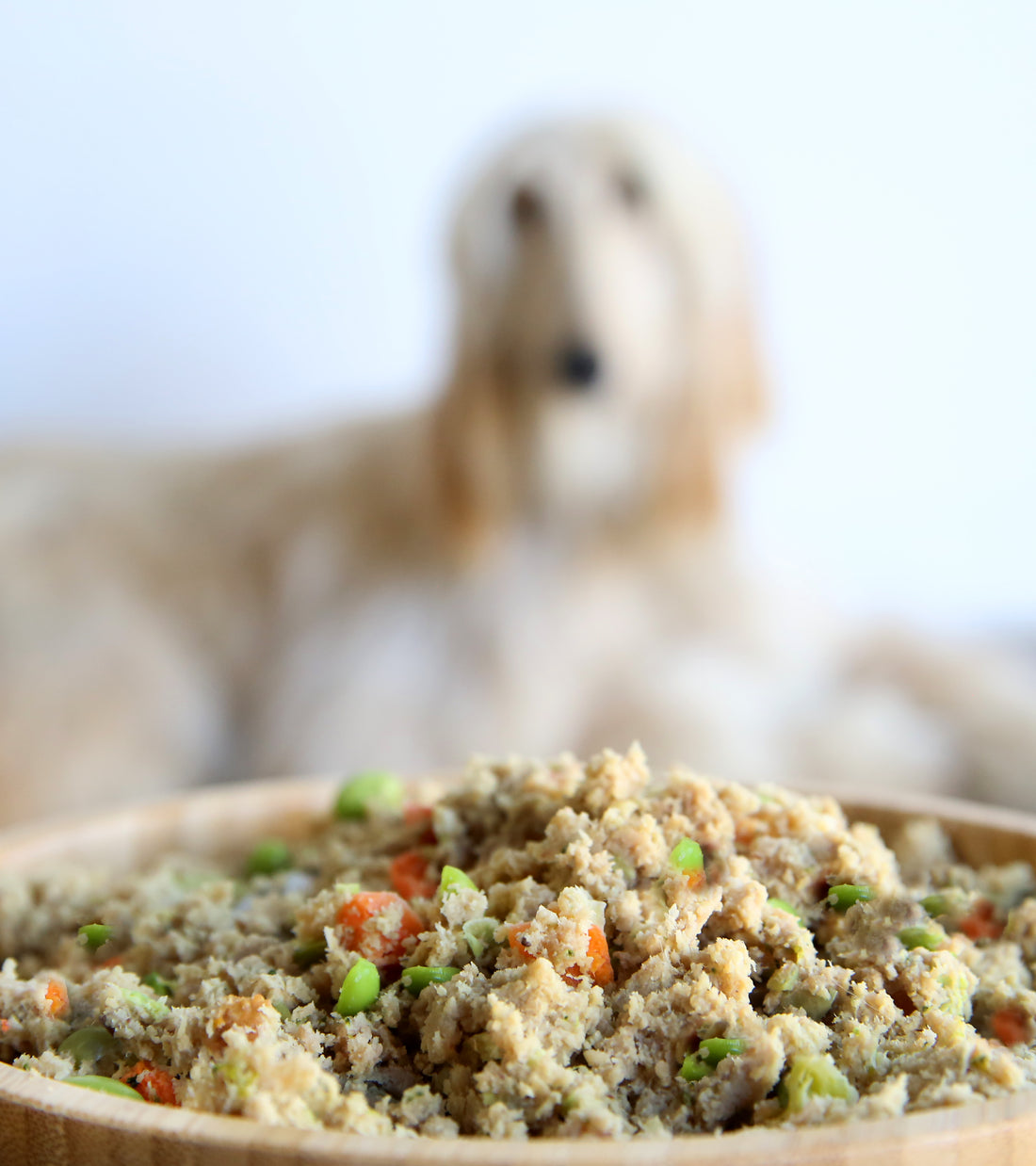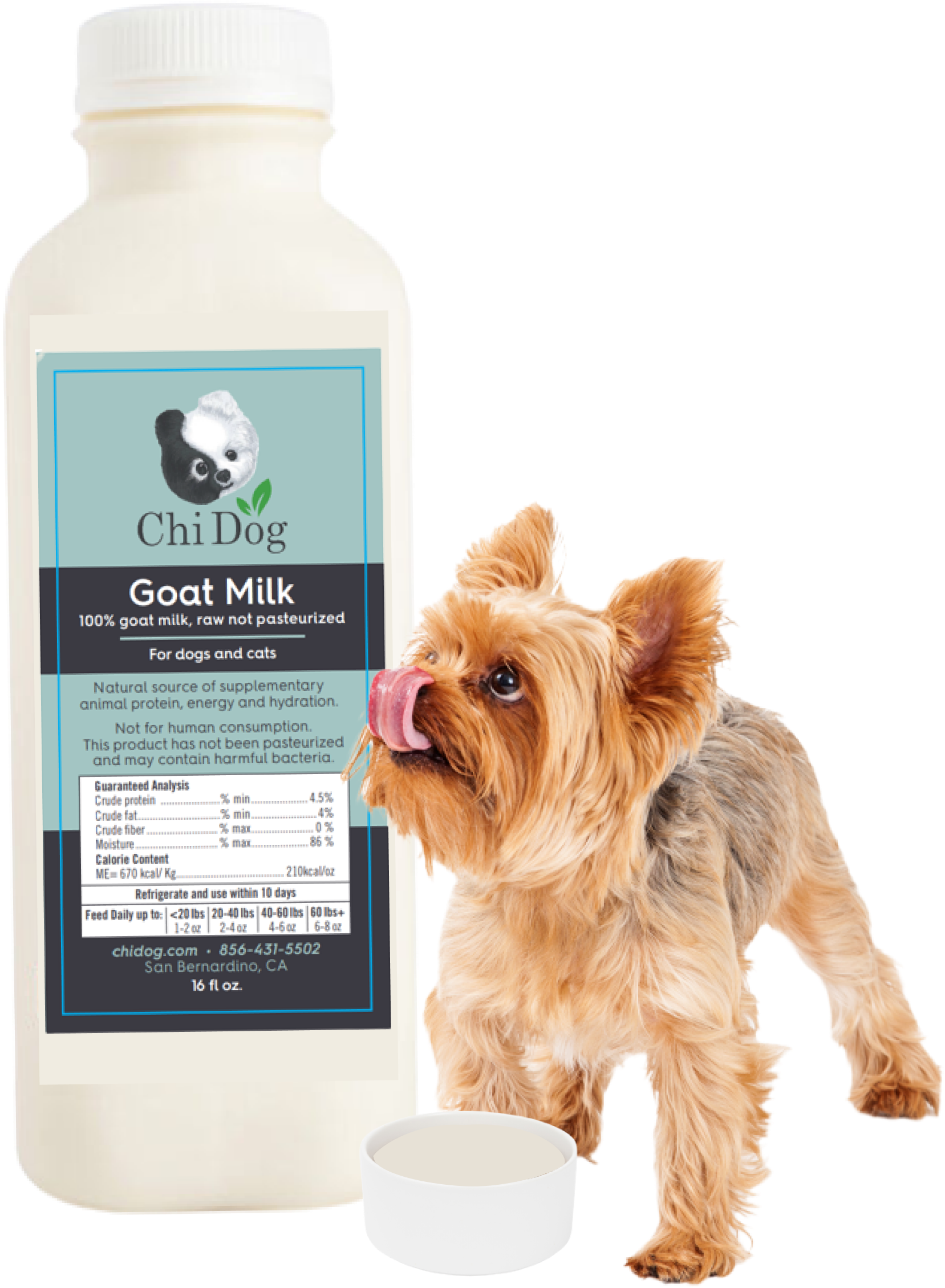
What to Feed a Dog With Inflammatory Bowel Disease (IBD)


Seeing your beloved dog grapple with health challenges like Inflammatory Bowel Disease (IBD) can be heartbreaking, leaving you feeling helpless. But you're far from powerless in this situation - quite the contrary.
As a pet parent, you have the power to dramatically transform your dog's quality of life and to bring comfort and relief to their day-to-day experience. In fact, it may be as simple as switching to an dog IBD diet. And in this guide, we’ll empower you to be the pet parent they need right now and explain what to feed a dog with inflammatory bowel disease.
You’ll discover the best dog food for inflammatory bowel disease right here at Chi Dog, backed by the tried-and-true principles of traditional Chinese medicine food therapy. Our Water Diet may be able to provide dramatic relief and help them feel like their old self once again.
As we begin, let’s look at what exactly inflammatory bowel disease is to set the stage for a conversation on how changing your dog’s diet can help.

All About Inflammatory Bowel Disease (IBD) in Dogs
Inflammatory Bowel Disease, or IBD, is a group of chronic gastrointestinal disorders characterized by the persistent inflammation of the dog's intestinal wall.
It's not a single disease but rather a term encompassing several conditions that share common symptoms but may have different underlying causes.
From a Traditional Chinese Medicine (TCM) perspective, inflammation, such as that seen in IBD, is often linked to an imbalance in the body's energy, referred to as “Qi” (pronounced “chi”).
This imbalance can manifest as excess heat, dampness, or even a blockage in the flow of Qi, all of which can lead to inflammation and subsequently symptoms associated with IBD.
IBD is an unfortunately common issue for dogs, affecting canines of all breeds and ages. However, it tends to be more prevalent in middle-aged to older dogs, and certain breeds may be more susceptible due to genetic factors.
The Symptoms and Diagnosis of IBD in Dogs
The symptoms of IBD in dogs are typically associated with the gastrointestinal tract. These can include chronic diarrhea, vomiting, loss of appetite, weight loss, and in some cases, lethargy. In TCM, these symptoms can indicate an imbalance in the body's elements, manifesting as health issues.
Diagnosis of IBD often involves a combination of physical examination, detailed history, and specialized tests such as blood work, ultrasound, and endoscopic biopsy. It's crucial to consult a vet if you notice any persistent changes in your dog's digestive habits or overall health.
Potential Causes of IBD in Dogs
Western medicine claims that the exact cause of IBD in dogs is unknown. However, it's believed to be the result of an inappropriate immune response to the dog's own intestinal microflora, influenced by genetic factors, diet, and environmental triggers.
In TCM, though, we take a different stance. The cause of IBD is fairly simple: an imbalance in Qi as a result of an improper diet.
For example, a dog with a “hot” constitution might experience excess heat in the body, which could manifest as inflammation in the intestines. Thus, addressing this imbalance through an dog IBD diet, lifestyle changes, and other holistic treatments can be a beneficial strategy in managing IBD.
Remember, if you suspect your dog may have IBD, it's essential to reach out to your veterinarian for a proper diagnosis and treatment plan.

Can a Dog IBD Diet Help?
The journey of being a pet parent to a dog with IBD can be challenging. But with understanding and proactive care, you can support your dog in leading a comfortable, joyful life. That being said, can a dog IBD diet really help that much?
Yes, it can. There is no denying the role between what you eat and how you feel. This is true of many other conditions too, including those with similar symptoms like pancreatitis or even liver disease.
Because IBD symptoms are attributed to inflammation in the digestive tract, what your dog eats can either help soothe the symptoms or exacerbate the inflammation, leading to a reduction (or agitation) in symptoms.
In Traditional Chinese Medicine (TCM), food is not merely a source of calories and nutrients, but a means to balance the body's energies and restore health.
Different foods have varying energies, flavors, and movements, which can influence the balance of Qi, Yin, Yang, and other elements in the body. Therefore, by selecting the right foods for your dog's unique constitution and condition, you can help mitigate the symptoms of IBD.
That being said, let’s get into what you came here for today: to learn what to feed a dog with inflammatory bowel disease.

What to Feed a Dog With Inflammatory Bowel Disease (IBD)
So, what is the best dog food for inflammatory bowel disease? If you’re wondering what to feed a dog with inflammatory bowel disease, you won’t have to look far. Our holistic dog food has been carefully formulated in accordance with the principles of traditional Chinese medicine food therapy.
Before we talk about what makes our dog IBD diet the best choice for you and your four-legged friend, let’s assess the nutritional needs of a dog suffering from this condition.
Understanding the Importance of Ingredients in Your Dog IBD Diet: Nutritional Needs & What to Look For
When it comes to managing Inflammatory Bowel Disease in dogs, understanding the key dietary components is crucial. The primary focus should be on providing a diet that's easily digestible and hypoallergenic. This combination of characteristics ensures your pet is receiving essential nutrients without exacerbating their sensitive digestive system.
The choice of protein is critical. Novel proteins, or proteins your dog hasn't been exposed to before, are often recommended. Pork, for instance, is a great choice. These novel proteins can reduce the risk of an immune response that could worsen inflammation.
From a Traditional Chinese Medicine (TCM) perspective, the choice of ingredients in the diet should not just provide physical nourishment but also help balance the body's energies. For a dog with IBD, this could mean choosing foods that cool the body, dry dampness, or move the Qi.
Our Philosophy of Formulating Dog Food for IBD
At Chi Dog, we believe in harnessing the healing powers of food. As veterinary practitioners with years of experience under our belts, we’re eager to empower you with a dog IBD diet that can help your pet live a healthier, happier life. And by extension, we seek to help you find the peace of mind you deserve.
Rooted in TCM principles, we design our recipes to provide not just the physical nourishment your dog needs but also energetic balance. We see food as a tool to help your pet's body regain its equilibrium, alleviate symptoms, and improve overall wellness.
And while we offer a variety of diets to choose from, our Water Diet is recommended for a dog with IBD. Here’s why…
What Makes Our Dog Food for Inflammatory Bowel Disease the Right Choice for Your Pet? All About the Water Diet
The Water Diet we've developed is a testament to our philosophy. It's a hypoallergenic, kidney-supportive diet tailored for dogs with health conditions like IBD.
The core ingredients of this diet include pork, pearled barley, green peas, watercress, and sweet potato - all chosen for their unique energetic properties.
Pork serves as the primary source of protein. It's considered neutral to cooling in TCM, making it ideal for dogs with IBD that may have excess heat contributing to their condition. Other ingredients like sweet potatoes, pearled barley, and green peas help dry dampness, while watercress helps move Qi.
The Water Diet is also low in carbohydrates, making it easier for your dog's digestive system to process. Beyond aiding in IBD management, this diet also provides support for kidney health, back pain, hind leg weakness, and can be beneficial for dogs with food allergies and ear infections.
It's an excellent choice for healthy dogs as a maintenance diet too, especially for those who are picky eaters. And below, we’ll offer a few tips on getting your pet adjusted to the new diet.
Transitioning Your Dog to a New Diet: Tips for Success
Changing your dog's diet should be a gradual process to avoid any digestive upset. Start by mixing a small amount of the new food with their old food, gradually increasing the proportion of the new food over 7-10 days.
Be patient and closely monitor your dog for any changes in their behavior, appetite, or stool consistency during the transition. And while you’re getting your pet started on our IBD dog diet, try these additional lifestyle adjustments…
Feeding Them the Best Dog Food for Inflammatory Bowel Disease is Just One Piece of the Puzzle…
Beyond what to feed a dog with inflammatory bowel disease, there is a lot you can do to help your pet find relief and live a healthier, happier life.
The Role of Probiotics and Digestive Supplements in Managing IBD
While diet is a fundamental component in managing IBD, additional support can come from probiotics and digestive supplements.
These beneficial microorganisms can help restore gut flora balance, promoting better digestion and reducing inflammatory responses.
Always consult with your vet before starting any new supplement regimen to ensure it's right for your dog.
Understanding the Impact of Stress and Anxiety on Canine IBD
Just as in humans, stress and anxiety can worsen gastrointestinal issues in dogs. By creating a calm and stable environment, you can help manage your pet's IBD symptoms.
Keep changes in the daily routine to a minimum, and consider stress-reducing tactics like providing a quiet space for your pet and using calming toys or puzzles.
Hydration: The Often Overlooked Aspect of IBD Management
Hydration plays a crucial role in digestive health, especially in dogs with IBD. Dehydration can worsen symptoms and lead to other health issues.
To ensure your pet is well-hydrated, always provide fresh water. You can also increase hydration by incorporating moisture-rich foods like our Water Diet into their meals.
Complementary Therapies: Acupuncture and Herbal Medicine for Dogs with IBD
Alongside nutritional management, there are other complementary therapies that can support your dog's health.
Acupuncture, a practice rooted in TCM, can help manage symptoms by restoring energy flow and balance in the body.
Herbal medicine, under the guidance of a trained professional, can provide additional support to alleviate symptoms and improve overall well-being.
But, it all starts with what to feed a dog with inflammatory bowel disease. And with that said, it’s time we brought this conversation on the best food for dogs with IBD to a close.
Bringing Our Conversation on the Best Dog Food for IBD
Managing canine IBD is a multi-faceted task, but with the right approach, your furry friend can live a comfortable, happy life. We hope this conversation on following a dog IBD diet helps your pet feel better fast.
Nutrition, specifically an IBD-friendly diet like our Water Diet, is the cornerstone of managing the condition. Still, it works best when combined with other strategies like stress reduction, hydration management, probiotics, and complementary therapies.
At Chi Dog, we're dedicated to promoting your pet's health through food. Our meals are thoughtfully crafted using the principles of Traditional Chinese Medicine, offering a unique approach to pet health. It's not just about feeding them but nourishing their body and soul.
_________________________________________________________________________
About the author
Dr. Susan Bohrer has been a practicing veterinarian for 15 years teaching home cooking techniques to clients. Dr. Bohrer is Certified in Traditional Chinese Veterinary Medicine’s Herbal Therapy, Acupuncture and Food Therapy.



